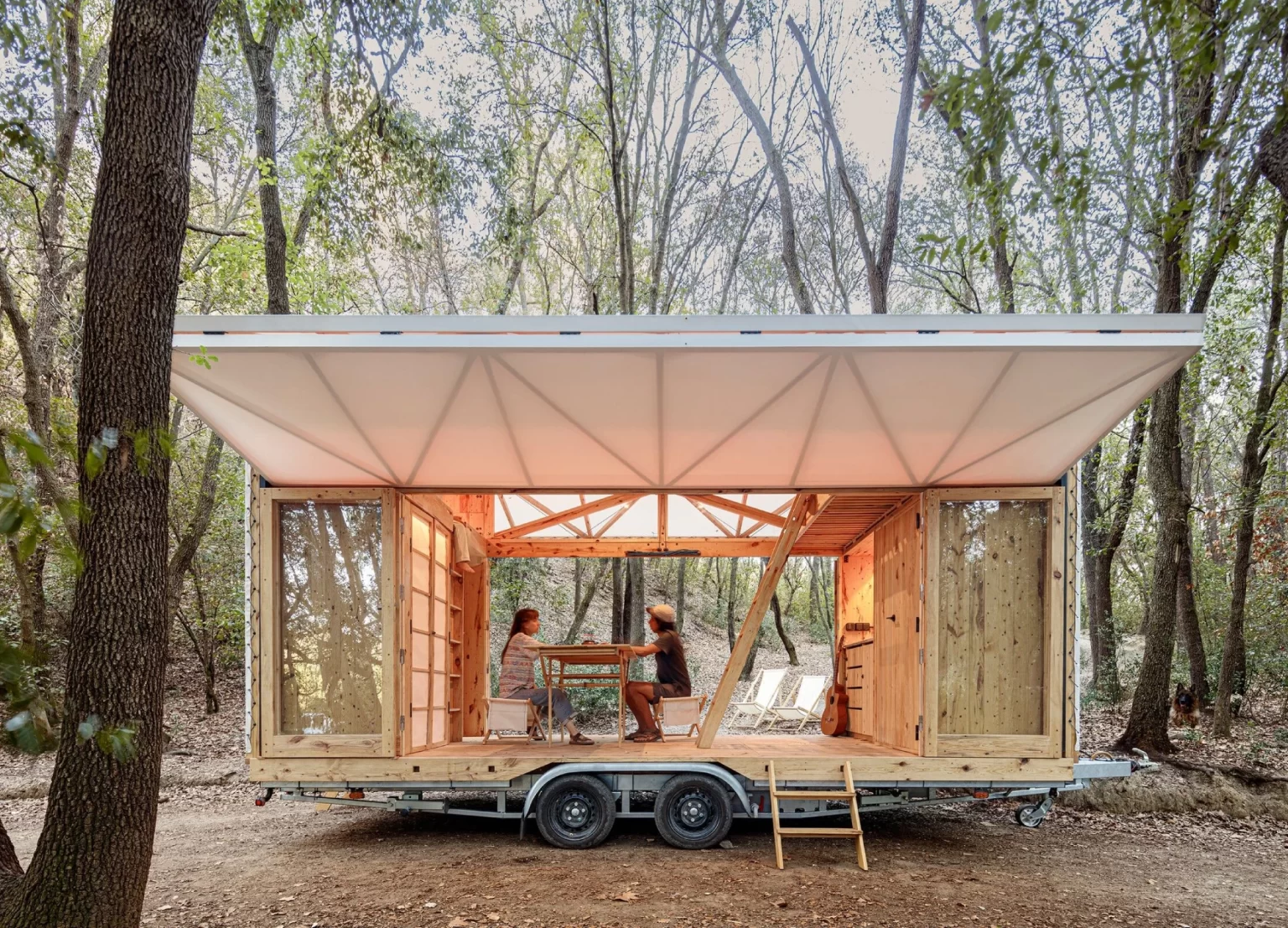The Mobile Catalyst (MO.CA) is an innovative and sustainable mobile home designed by students, utilizing ‘zero-kilometre’ natural materials and advanced digital construction techniques. This project explores the concept of a mobile dwelling, provoking deep discussions on nomadism and community support. Key questions arose during its development: How could a mobile home maximize its mobility? How could it contribute to its surroundings? Could it foster collaboration and knowledge sharing? These considerations led to a regenerative design that connects, collects, and shares resources within networks, evolving from a simple home into an experiential engagement facilitator, hence named MOCA. The design faced constraints due to the trailer on which the home is based and local regulations. The final solution rests on a 5.4-meter long and 2.4-meter wide platform, with the house standing 3.6 meters high. Regulations limited the total weight, including the trailer, to 3,500 kg and required the driver to have Permit B96. These specifications significantly influenced design decisions, ensuring the project adhered to weight and size limitations while maximizing functionality and livability.

MO.CA’s design features two solid toolboxes anchoring the structure, each containing tools and surfaces that activate the central ‘reaction chamber.’ The Utility Toolbox, or Toolbox A, situated at the front, is the heavier unit, incorporating essential home utilities like a kitchen, shower, toilet, and cabinets for electrical and water systems. The Activity Toolbox, or Toolbox B, contains elements that facilitate various activities in the central space and includes the main entrance door. The toolboxes are constructed from 4 cm thick dowel laminated timber (DLT) panels, avoiding toxic adhesives and promoting potential reuse. The mobile home’s operable facade consists of glass doors and a fabric layer, allowing flexibility in adapting the central space’s enclosure to weather, time of day, and activities. The glass doors can be fully or partially opened, dissolving the boundary between interior and exterior, while the fabric facade provides additional adaptability and protection.

Powered entirely by solar energy, MO.CA can sustain 24-hour use without recharging. Energy is mainly consumed by media activities and basic home appliances. Lightweight, flexible monocrystalline solar panels on the roof connect to a MultiPlus inverter and a battery backup, with LED strips lighting the interior and emphasizing the textile enclosure’s glow. The mezzanine floor features two beds, one extendable, accessible via a movable ladder. The kitchen is equipped with a sink, one-burner stove, drawers, and a fridge, with indicators for battery and water levels on the kitchen wall. The washroom includes a waterless humus toilet and a shower, with water conservation and treatment systems ensuring efficient and sustainable use. Greywater from the shower is filtered and reused, while kitchen sink water is stored for external treatment.

Toolbox B also houses a wardrobe with custom, space-saving furniture designed for various activities. This includes a table, stools, lounge chairs, and Fab-kits for first aid, fire safety, and storage. The furniture is lightweight, foldable, and made from timber, fabric, and dowels, secured with fabric belt straps during transit. The wardrobe doors match the design style, combining timber and fabric for a cohesive look. MO.CA’s innovative design and sustainable features offer a versatile, mobile living solution that promotes environmental responsibility and community engagement. By rethinking traditional housing concepts, it demonstrates how mobile homes can connect with and contribute to their surroundings, fostering a collaborative and regenerative lifestyle.
Source » IAAC
Related posts
- Ninja SLUSHi Professional Frozen Drink Maker: Icy Treats at Home
- DJI Glide Concept: Energy-Efficient Drone with Foldable Wings
- BOYA Mini: The World’s Smallest Wireless Microphone
- Pokit Current Clamp for Compact, Powerful, and Portable Measurement
- SoloCam S340: 360° Solar-Powered 3K Camera with AI & Night Vision

